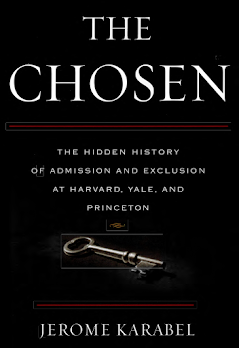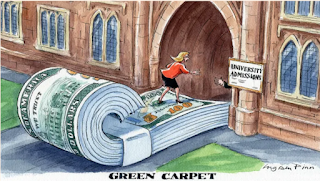Literature Review #2
Karabel, Jerome. The Chosen: The Hidden History of Admission and Exclusion at Harvard, Yale, and Princeton. Houghton Mifflin Company, 2005.
Summary:
The Chosen recounts a history of anti-Semitism and show how the Big Three—Harvard, Yale, and Princeton—constantly tweaked the admissions criteria to reduce the admission of Jews. Realizing that the definition of merit based solely on academic criteria was leading to unwanted students, the Big Three redefines merit, making highly subjective qualities such as “character” and “personality” central to the criteria. Karabel’s overarching theme is that admissions policy inevitably reflects the values and cultural ideals of the dominant group and that those decisions are inconsistent with the public interest. Inspired by Michael Young’s The Rise of the Meritocracy, Karabel believes that ideology of merit has its dark side as it ultimately deflects attention from real issues of inequality onto the unachievable social mobility.
Author:
Jerome Karabel is a professor of sociology at the University of California, Berkeley. Since the 1970s, Karabel has had a special interest in the politics of university admissions. His research explores notions of meritocracy, opportunity, access, and cultural capital in American higher education. In 1989, he chaired the Admissions and Enrollment Committee for the Academic Senate of the University of California at Berkeley and wrote the report, “Freshman Admissions at Berkeley: A Policy for the 1990s and Beyond”. In 2009-2010, he was a Fellow at the Woodrow Wilson International Center for Scholars in Washington, where he was working on a project entitled “American Exceptionalism, Social Well-Being, and the Quality of Life in the United States.” He also writes for non-academic audiences in publications such as The New York Times, The Huffington Post, The New York Review of Books, The Los Angeles Times etc. His book The Chosen: The Hidden History of Admission and Exclusion at Harvard, Yale, and Princeton, has received the Distinguished Scholarly Book Award from the American Sociological Association.
Key words:
- Hook: Any attribute that makes a student attractive to a particular college such as legacy status, athletic talent, or membership in a historically underrepresented group
- Tagged categories: members of the three groups—legacies, athletes, and members of targeted minority group
- Prisoner’s Dilemma: Dilemma faced by the Ivy League Colleges on eliminating early admissions programs. No college is willing to eliminate EA first since they would be at competitive disadvantage in capturing attractive students.
Quotes:
Especially in "a politically free, private property, contractually organized economic system," wrote Brewster in a passage quoted earlier, "it is terribly important to keep alive the widespread confidence that success in America is a function of merit and effort" (qt. in Karabel 541-542).
Yet at certain historical moments - especially in periods of social crisis, when the legitimacy of the system itself is in question - the elite colleges will reach out beyond the privileged to the disenfranchised. They do so not because the visible presence of previously excluded groups adds to the diversity of their students' educational experience, but because it reinforces a belief - crucial to the preservation of the social order - that success in America is a function of individual merit rather than family background (Karabel, 545).
In the meritocracy, Young writes, "the upper classes are ... no longer weakened by self- doubt and self-criticism," for "the eminent know that success is just reward for their own capacity, for their own efforts, and for their undeniable achievement . . . As for the lower classes, they "know that they have had every chance" and have little choice but to recognize that their inferior status is due not as in the past to a denial of opportunity, but to their own deficiencies (qt. in Karabel 556).
Value:
As this book explores how the admissions policies of elite universities have long been tightly controlled and veiled, it will help me answer how the admissions policies of elite schools have evolved and what exclusive and meritocratic policies say about America.


Comments
Post a Comment